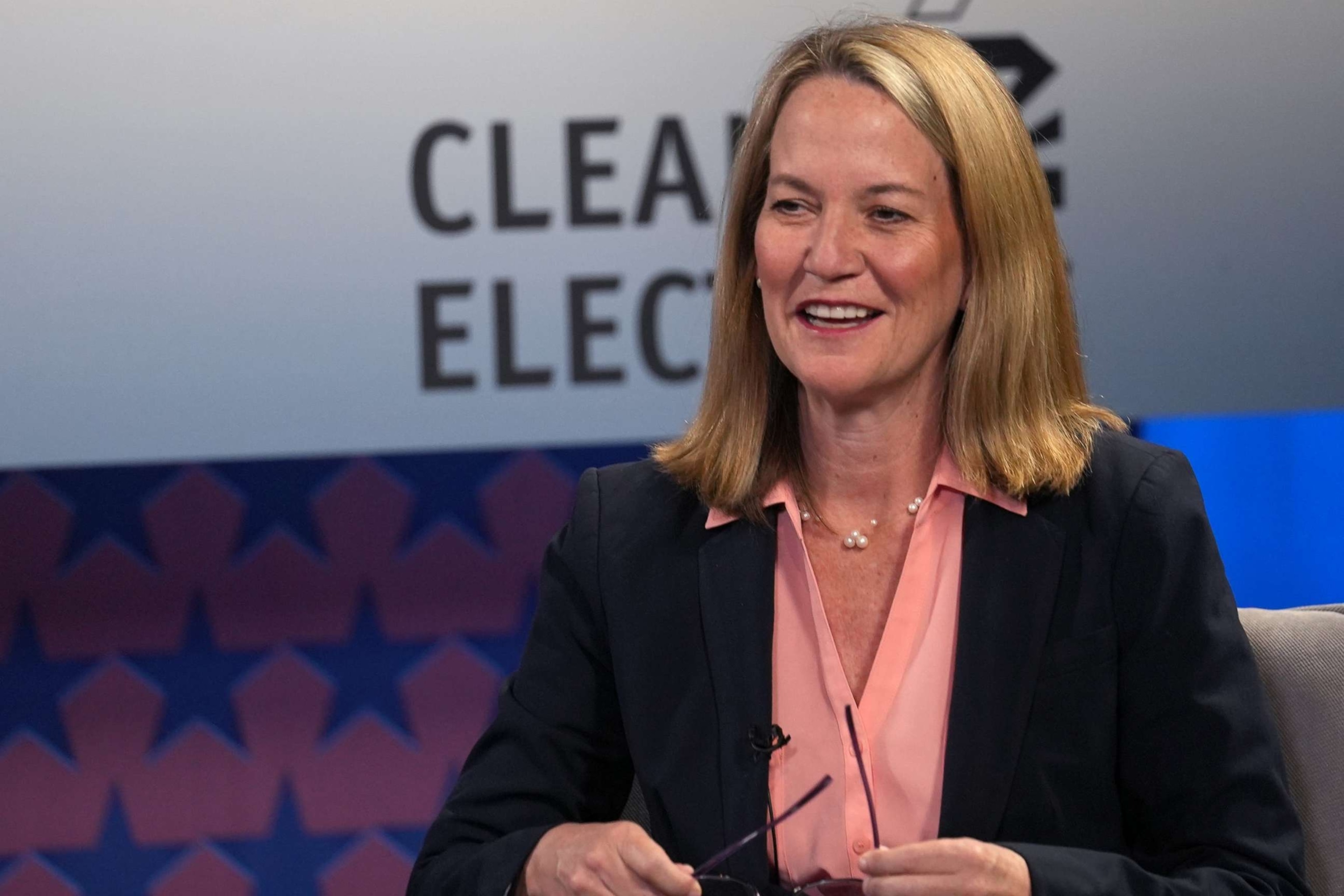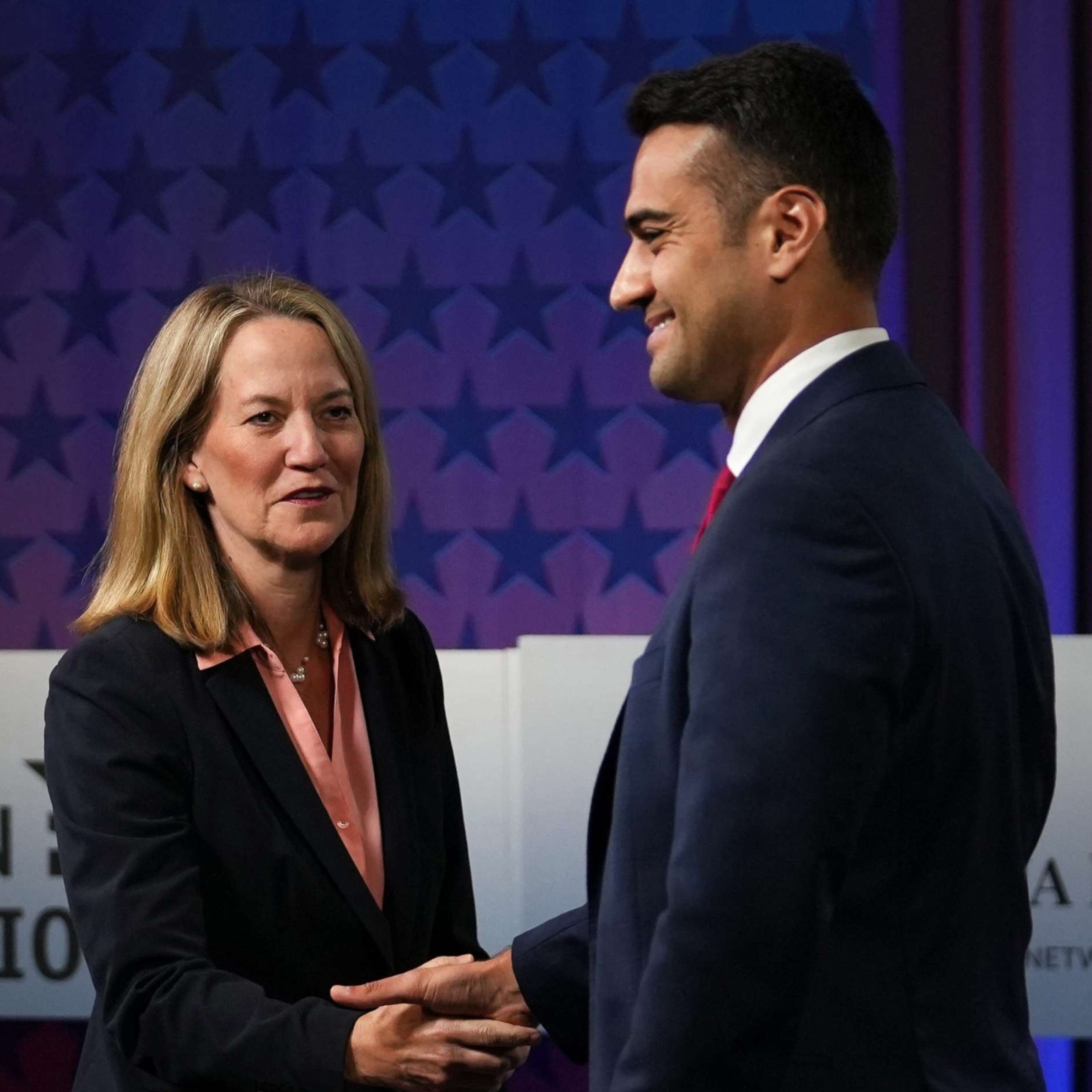Arizona's attorney general candidates spar in debate on abortion, election lies, more
Abe Hamadeh and Kris Mayes met for their first debate on Wednesday.
Arizona Democratic attorney general nominee Kris Mayes and her Republican opponent, Abe Hamadeh, sparred on a debate stage in Phoenix on Wednesday, both agreeing that the differences between them -- on abortion, on the validity of the 2020 election -- were crystal-clear.
Mayes said, as attorney general, that she wouldn't prosecute any health care provider who violates a state abortion ban with no exceptions for rape and incest cases, deeming the law unconstitutional under Arizona's right to privacy. Hamadeh said he would follow the newly reinstated territorial-era abortion ban, calling his opponent's resistance "dangerous."
"I think there's a clear difference," Mayes said. "My opponent wants to put doctors and nurses and pharmacists in jail for abortion care, and that's outrageous."
While calling it "an important distinction" between them, Hamadeh said: "There's an argument to be made on both sides, but I'm tasked to uphold the law."
He insisted that he doesn't make the law: "I think it's a sign of maturity to understand your role as attorney general is not to put personal beliefs into your decision making. Mayes blasted that stance in the case of a Civil War-era law banning all abortions in Arizona except to save a mother's life and mandating jail time for doctors who assist in the procedure.
"I will not prosecute any doctor, any pharmacist, any nurse for abortion," Mayes said. "Period."
She also told reporters after the debate that, if elected, she would issue an opinion to Arizona's 15 county attorneys that her view as the state's top legal officer is that prosecuting abortion is unconstitutional.

Power Trip
"Power Trip" follows 7 young reporters as they chase down candidates in the lead up to the midterms with George Stephanopoulos guiding them along the way.
On stage, she and Hamadeh exchanged condescending blows about the other's background, with Mayes knocking Hamadeh's age -- he's 31 -- and Hamadeh attacking Mayes' lack of time at trial despite her background as a lawyer.
"You're confused about the Arizona Constitution -- I know you only graduated from law school a few years ago," Mayes said at one point.
Hamadeh swiped at the Arizona Republic reporter moderating the debate and at Mayes for having worked at the newspaper 22 years ago. Hamadeh recalled how Mayes was once kicked off Sen. John McCain's press bus while she was a reporter -- which she laughed at.
"I spent 30 years as a Republican, just one year shy of the amount of time you've been alive on this earth. And John McCain supported me," she said. (And he did, when Mayes ran for the Arizona Corporation Commission.)

While candidates in state attorney general races are often lesser known than those at the top of the ticket, such races have drawn more attention in 2022 in large part due to Republican candidates clinging to the false belief that the 2020 election was rigged.
"Every single one of these Republican candidates for statewide office are election deniers. They are all dangerous. They all do not believe in American democracy, and they must be defeated for American democracy to survive," Mayes told ABC News after Wednesday's debate, alluding to 14 Donald Trump-backed hopefuls on the ballot in Arizona.
Pressed Wednesday on his calls to prosecute crimes that he's alleged in the 2020 election, Hamadeh doubled-down on that baseless belief, telling the debate moderator, "Of course. I'm a former prosecutor, you prosecute crimes that occurred in the past."
Mayes seized on that. Hamadeh has said he would have challenged the election results and chanted "lock them up" at a rally with Trump in Prescott, she noted.
"For you to sit here and say that I am picking and choosing laws is ridiculous," she said.
Asked if he felt the 2020 election was rigged, Hamadeh said "clearly" -- though Trump's defeat has been verified by audits, hand recounts and numerous local officials from both parties.
"All of us want free fair and competent elections," Hamadeh said.
Mayes called Hamadeh's attacks on the last election "anti-democratic" and alluded to a Phoenix New Times report which found Hamadeh had seemingly admitted to committing voter fraud during the 2008 presidential election. In a series of message board posts as a teenager, he wrote that he had changed his mother's vote on her absentee ballot.
"I think it's ridiculous to suggest that what I do at 15 is somehow gonna affect me when I'm attorney general," Hamadeh responded.
According to FiveThirtyEight, seven election deniers are running across the U.S. for state attorney general with seven more running for secretary of state, the post that oversees election administration in most areas. That includes Arizona's Republican nominee for secretary of state, Mark Finchem, a far-right lawmaker who has said he wants to change how Arizona's elections are run by restricting mail ballots and removing electronic voting machines.

Finchem -- who met for a heated debate of his own last week with Democratic candidate Adrian Fontes – insists Trump won the 2020 race, though Trump lost to Joe Biden.
Earlier this week, the Democratic Association of Secretaries of State announced an $11 million ad buy in Michigan, Minnesota and Nevada -- three battlegrounds with incumbent Democratic secretaries of state who are running against election-deniers. The group has also promised spending in Arizona and Georgia.
At Wednesday's attorney general debate, one thing Hamadeh and Mayes agreed on was the importance of addressing the flow of drugs into their state. They differed on how, though.
Asked about tackling fentanyl coming across the southern border, Hamadeh said he would work with the legislature and governor to declare drug cartels a terrorist organization on "day one."
Mayes said she would work with law enforcement officials along the border and go after funding in the state's $5 billion-surplus to tackle fentanyl.




